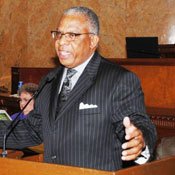The Mississippi House of Representatives is expected to vote today on a plan to use $100 million in reserve funds this year to shore up agency budgets that were slashed in Gov. Haley Barbour's most recent round of budget cuts. The House Appropriations Committee approved the measure yesterday afternoon in a brief meeting.
"It makes the situation somewhat bearable; we can certainly say that," Rep. Steve Holland, D-Plantersville, said of the bill during the committee meeting.
The House measure is a revision of Senate Bill 2495, which the Senate passed Jan. 13, granting Barbour authority to make selective cuts to any agency budget up to 10 percent. In approving the House version, committee members also reduced that figure to 5 percent.
The measure would offset some of the $216 million in cuts for this fiscal year that Barbour announced Jan. 22, using $50 million from the state's rainy-day fund and another $50 million from the Health Care Trust Fund endowed from the state's 1994 tobacco settlement. Education would receive nearly $50 million of the reserve funds, with K-12 education getting $43 million and the state's institutions of higher learning receiving $15 million.
Even with that help, K-12 education funding for this year would still be 6.37 percent, or $151 million, below the original appropriations level, while higher education would still receive 5.86 percent, or $38.6 million, less than originally appropriated.
The House plan would also provide $6.8 million to junior colleges, to offset $19.9 million in recent cuts. Of the $8.3 million going to the state Department of Mental Health, $6 million would be earmarked for community mental-health crisis centers. Also included in the House bill would be $2.9 million for the Department of Revenue, $4.9 million for the Department of Health and $2.9 million to the Mississippi Highway Patrol.
Rep. Cecil Brown, D-Jackson, told committee members that the House plan would provide $2.2 million to restore all assistant district attorneys positions in the state. Barbour slashed $1.4 million for those positions last week, and the shortfall has raised the possibility of furloughs and increased case backlogs at district attorneys' offices.
While Barbour has restricted the use of reserve funds in the past, recent statements suggest that the governor may be amenable to using more one-time money in the current fiscal year.
"Since I've been governor, it has become clear to me this trust fund-the Health Care Trust Fund, as it is officially known-is not and never will be held in trust in the true sense of the word," Barbour said in his Jan. 18 State of the State address. "It will never build up since the interest or earnings are not large enough to be material in future budgets."
Barbour said he would agree to spending the roughly $220 million balance "over a period of at four years."
Similarly, Barbour has said that the $230 million rainy-day fund, officially known as the Working Cash Stabilization Fund, must last three more years. He rejected a previous House budget plan for the current fiscal year because it relied on an additional $50 million from the Rainy Day Fund.
"I consider one of the worst mistakes that can be made at a time like this would be the excessive use of one-time money," Barbour said in his State of the State address.
Rep. George Flaggs, D-Vicksburg, argued that current cuts, if allowed to stand, would cripple many state agencies. The Mississippi Tax Commission would likely lay off 200 employees, forcing a delay in the processing of income tax returns. The state Highway Patrol would also be forced to furlough troopers or reduce their hours, Flaggs warned.
"I don't know about where you all live, but in my Walmart, in my barbershop, they're telling us it doesn't make sense to cut these agencies the way we're cutting them if you've got a half a billion dollars in the savings account," Flaggs told committee members. "(If) you don't vote for this bill, you can say, 'I saved the state a half a billion dollars. I didn't raise your taxes. But I didn't guarantee no public safety; I didn't guarantee no public education; I didn't guarantee no public health.'"



Comments
Use the comment form below to begin a discussion about this content.
comments powered by Disqus